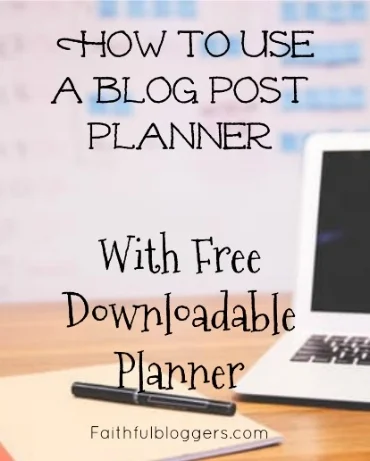Organizing Your Blogging Business: 10 Things to Consider Before Starting a Blog (Part 6 of 10)
/This post contains affiliate links, which means if you click links we may receive some compensation at no additional cost to you.
One of the most important things to consider before you start your blog is how you are going to keep your blog business organized.
Some of you may not be blogging as a business, I understand, but it would still be helpful to you to get a good system of organization in place.
If you set up a good organizational system right from the start you will save yourself a lot of headache later.
Let's take a look at some of the basics of organizing your blog business.
1. Create a Plan
I am a firm believer in the process of planning. Planning has had a huge part to play in the success of our family businesses. Trust me on this, right from the start of your blogging journey, create a plan. You will not regret the time spent on planning.
There are two types of plans I would suggest you write.
The first is an overall plan for your year. This would include your goals for your blog business but would also include your goals and plan for your family, other work, etc. This planning does not have to take place at the beginning of the year, you can put a plan in place no matter what month you are currently in. If you need a resource to help you with your yearly planning, take a look at our course called "Write a Yearly Plan", it's a faith based yearly planning course.
The second type of plan you should create is a blog plan. You can do your planning with a calendar or other type of planner but if you are looking for a great resource to assist you check out "Epic Blog", it's a one year blog planner. It's a very helpful resource.
2. Bookkeeping for Your Blog Business
It is super important to set up a system right from the start for keeping track of your blog business bookkeeping. I personally use Quickbooks and it works well for my needs. In addition, by using Quickbooks, I am ready with all the paperwork needed when tax time rolls around. Whatever you choose to keep track of your income and expenses, get it set up right away.
3. Passwords and Logins
Right from the start decide on a system to keep track of all your login and password information. Don't make the mistake of thinking you are going to remember them all and don't make the mistake of thinking you will use the same password for everything...it won't work! Some password requirements are different than others and require symbols or different number of upper and lower case letters. Just choose a system and use it for every single place you have to log in to. You can use a word document, or open up a notepad. You could even use paper and pen....whatever you choose is fine. Just get it set up. There are also password apps available if you prefer to keep track of passwords electronically.
4. Blog Post Ideas
Create a place to capture your blog post ideas. I use a combination of post it notes on a board in my office and I also use a binder. I jot down ideas onto post it notes and put them on the board. Once they become more than a single thought I transfer them to a blog post planner sheet and put them in a binder. Here is a link to read about and access for free the exact blog post planner which I use. If you prefer to keep track of things digitally you can use something like Evernote or even just use your notepad in your smartphone. Even if you use a paper version system for keeping track of ideas it is good to have a plan in place for capturing these ideas when you are out and about and don't have your paper system on hand. When I am out and have ideas I add them to the notepad in my phone.
5. Files
Set up a system for your paper files. Get yourself a file cabinet and some hanging as well as manilla folders. Set up your system and use it daily.
Then set up a system for your online files and documents. Set up online storage using something such as Dropbox or Google Drive. Organize your online files using folders and create a system which makes sense to you so you'll be able to find things when you need them.
6. Miscellaneous Stuff
Set up a way to keep track of anything which you would need to find later. For example you may want to create a document in Excel to keep track of importantant things. I find using an Excel spreadsheet works well because I can add a sheet to it for each group of information I want to keep track of. Then I have all my important things together in one document but separated and organized by sheet (page). You can use your Excel spreadsheet to track things such as:
- Links to websites which have mentioned your blog
- Affiliate links
- People whom you've developed relationships with
- Websites where you'd like to guest post
- Anything else you want to be able to keep track of
These are just some of the things which you will want to have a system for. Think through all aspects of your blog business and put systems in place for everything. Setting up systems for keeping your blogging business organized right from the start will save you much frustration and headaches later.
What are some other things you have found important to organize for your blog business?
If you'd like to read the other posts in this series they can be found at the following links:
- Part 1: Why Do You Want to Blog?
- Part 2: Which Platform Should You Choose?
- Part 3: Who is Your Audience?
- Part 4: Blog Posting Schedule
- Part 5: Blog Branding
To access our members area and the free resources fill out this form.







